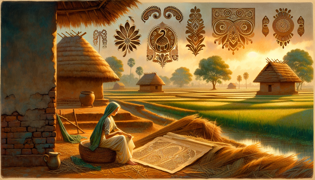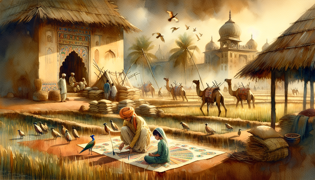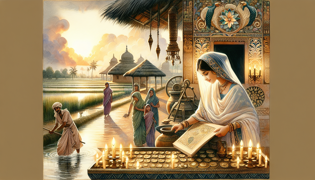Intellectual Girl: A Folktale of Wit and Courage from India
Reading Time: 9 min

About Story: Intellectual Girl: A Folktale of Wit and Courage from India is a Folktale from india set in the Ancient. This Descriptive tale explores themes of Wisdom and is suitable for All Ages. It offers Moral insights. A young maiden in ancient India uses quick wit and a fearless heart to outsmart every challenge and restore justice to her village.
Introduction
At the edge of the Ganges plain lay Sundarpur, a hamlet cradled by verdant fields as soft as satin. In a modest clay-walled home dwelt Vidya, whose name meant ‘knowledge’. Even as a toddler, she turned over beetle-winged leaves and traced their veins with the precision of a scribe. Sounds of temple bells drifted through the air, a low hum that mingled with the scent of jasmine and damp earth. She learned the language of stars from her grandmother, reciting moonlit verses until the night cicadas began their chorus. Vidya’s curiosity was like a restless river: it could not be dammed. One dawn, she pressed her small hand against the woven reed mat, feeling its rough fibres beneath her palm. The air smelled of fresh turmeric paste and smoky hearths, and she realised that every problem, from a broken pot to a tricky dispute, held a hidden pattern waiting to be unravelled.
Her mother would chuckle, Arrey wah, what mischief are you brewing today? Yet Vidya’s pranks were never cruel. She discovered that questions were keys, and wit the craftsman’s tool. By the time she reached twelve summers, tales of her cleverness rode the wind beyond Sundarpur’s banyan tree. Folk gathered to see how she solved riddles, mended quarrels, and even coaxed honey from a reluctant hive. In her heart, Vidya believed wisdom bloomed like a lotus in mud—and that courage was the gentle breeze that spread its petals. Thus began the story of an intellectual girl whose quiet tenacity would challenge greedy merchants, brazen bandits, and even a skeptical king.
A Curious Mind Awakens
In that hamlet of mud-brick dwellings and rust-coloured rooftops, Vidya’s thirst for puzzles was unmatched. She would tiptoe through her father’s silken threads, unravelling spindles while humming the tune of the harvest festival. Her fingertips lingered on each fibre, warm with dye, as she asked how colours could be trapped within petals or roots. Neighbours called her a sorceress of questions, for no lock could keep its secret from her. One afternoon, the temple priest arrived, carrying a palm-leaf manuscript stained by time. Its pages held the measure of sandalwood oil and the proportions of sacred incense—encoded so that only the worthy could read it. Villagers whispered that the code was as tangled as the banyan’s aerial roots.
Vidya sat by the lotus pond, its water mirror-calm. A gentle breeze stirred lotus petals, and the air smelled faintly of marigold and wet clay. She traced patterns in the mud, her mind weaving symbols like a golden spider spinning silk. Hours passed, broken by the distant caw of a koel bird. When she spoke the sequence aloud, it rang like temple bells: pure, resonant, undeniable. The priest gasped. “By the Ganges’ grace, child,” he murmured, “you see what eludes sages.” Arrey wah—she thought with a grin—wisdom really does grow where one is willing to seek it.
From that day, Vidya’s reputation spread beyond Sundarpur. Travelling merchants paused in the dusty lanes, offering rare spices and colourful textiles if she could decode their cryptic ledgers. Each problem was a river whose currents she studied patiently: she tested the depths, noted the eddies, and finally crossed by steppingstones of logic. Her fame carried the sweet tang of triumph, yet she remained humble. She often recalled her grandmother’s words: a blade burns only when tempered, and the heart shines brightest after trials. In this way, the curious mind of a young girl began to awaken the slumbering spirit of her people.

The Merchant’s Riddle
One dawn, a caravan clattered into Sundarpur. Camels’ bells tinkled like distant laughter, and the smell of saffron and camphor clung to every carpet. The head merchant, a portly man with a turban of deep indigo, unfurled a parchment sealed with wax. He announced a contest: any who could solve his riddle would earn ten silver coins and spices enough for a fortnight. The villagers crowded around, eager and curious. Yet when he read aloud, the riddle seemed as tangled as a snake’s coil: “Three brothers stand in a row, yet no man knows which way they go. Each holds a secret, none can share; turned by sun, turned by air.” Some shook their heads, others scratched beards greying with age. Not Vidya. She inhaled the faint spice-laden air, tasted its warmth like a secret. She closed her eyes and saw three spears in her grandfather’s courtyard, each pointing in different directions according to the sun’s path.
She asked the merchant to repeat the clue. Then she drew a simple diagram in the dust: a triangle with arrows at each point. The crowd pressed closer. “You speak of winds,” she declared. “The three brothers are the cardinal winds—east, west and south—each invisible yet turning the sail of every ship. The sun’s arc reveals them.” A hush fell. The merchant’s eyes widened; he smashed the wax seal and produced the coins. “You are as cunning as a mongoose,” he laughed, handing them over. Vidya curtsied, the coarse wool of her skirt brushing her ankles. Her mind felt as light as a sparrow’s wing. As she counted her winnings, the scent of turmeric from a passing stall drifted by, and the distant hum of a temple gong rippled through the marketplace like a heartbeat. She used the coins to buy grain for her family and brought sweet saffron rice to her grandmother, who tucked her hair behind her ear and whispered, “A clever mind feeds more than just itself.”

The Bandit’s Bluff
Weeks later, as monsoon clouds gathered, news reached Sundarpur of a feared bandit chief. He demanded tolls from every village along the river road—tolls that left families hungry and fields untended. On a rain-lashed night, the bandit stormed into Sundarpur, his horse stamping in muddy puddles. Thunder rolled overhead like a furious drum. He bellowed that the villagers must pay a heavy levy or face ruin. Hearts pounded; the sky smelled of wet straw and fear. Yet Vidya stood forward, her feet sinking into slippery clay. She offered a wager: if she could fill an empty vessel with water beyond its brim—without touching it—he would leave her people in peace.
The bandit laughed, sure the puzzle was a trick. He produced a large clay pot with a smooth rim. Vidya paused, listening to each raindrop as though it whispered secrets. She fetched a handful of sorghum seeds from her mother’s granary and began dropping them one by one onto the pot’s surface. The bandit sneered, but Vidya’s face remained calm. Slowly, the seeds formed a floating layer that pushed the water higher. “See how wisdom rides on patience,” she said softly, voice steady as a river’s flow. When the water finally spilled over, he cursed in astonishment, his coarse voice swallowed by rolling thunder. True to her word, Vidya negotiated that the bandit spare the villagers and only ask for a modest tribute of grain each month. He rode off into the storm, muttering that he had met his match. The scent of wet straw lingered, and frog croaks echoed in the fields. Villagers cheered, and Vidya’s grandmother pressed a damp cloth to her granddaughter’s brow, saying, “Your courage stays afloat on the smallest things.”

Wisdom in the Royal Court
Word of Vidya’s exploits rode the wind to the palace of Maharaja Vikram. Known for his stern countenance and fondness for courtroom puzzles, the Maharaja summoned her with an ornate scroll sealed in saffron wax. The royal guards led her through marbled halls where columns were carved like lotus stems. Torches guttered in crystal sconces, casting dancing shadows on polished floors. Vidya felt a mixture of awe and quiet resolve, her heart beating like a temple drum. In the great hall, courtiers in silk and brocade whispered as the Maharaja presented his challenge: a set of seven brass boxes, each containing a different jewel. Only one box held the king’s signet ring. She must choose without opening any.
Vidya studied the boxes. They were identical in shape but bore faint imperfections: one had a tiny dent at a corner, another a barely visible chip in its lacquer. She bent low, noticing the scent of sandalwood incense swirling around her. Recalling her grandmother’s lessons on patterns in nature, she compared each box to peacock feathers: no two are alike. Then she tapped each gently with her fingertip. The ring’s box gave a hollow note, as if it sheltered an airy secret. She pointed it out. The courtiers gasped; even the Maharaja nodded with approval. He opened that very box, and the ring lay nestled in crimson silk. “Young Vidya,” he proclaimed, his voice rich as aged wine, “your mind is sharper than any blade in my armoury.”
As reward, she asked only that the palace send teachers and books to Sundarpur, so every child might learn. The Maharaja smiled, granting her wish. When she returned home, laughter and tears greeted her beneath the banyan tree. Sunlight filtered through its leaves like scattered gold, and the air smelled of jasmine and new beginnings. Vidya realised that true royalty lies not in jewels or crowns but in sharing wisdom with open hands.

Conclusion
Vidya’s journeys—from deciphering sacred manuscripts by candlelight to confronting storms of rain and fear—became legends whispered around evening fires. Mothers taught their daughters her songs; fathers praised her name as they guided ploughs through soggy fields. In Sundarpur, a small schoolhouse rose where once only millet grew, its walls echoing with laughter and the scratch of chalk. Vidya often walked past, pausing to watch earnest faces bend over slate tablets, just as she had done. The fragrance of jasmine climbed the latticework, blending with the chalk’s tang and the low murmur of teachers imparting riddles and rhymes. Her grandmother, now frail but bright-eyed, would pat her hand and say, “You have planted more than seeds, child. You’ve sown the roots of wisdom.” And so the moral took root: intelligence paired with courage can outshine any crown, any threat, any despair. Like a lotus rising from muddy water, Vidya’s spirit proved that true greatness blossoms in the most humble soil. The tale of the intellectual girl endures, a shining lantern passed from one generation to the next, reminding all that wit and heart together can light even the darkest path.

















